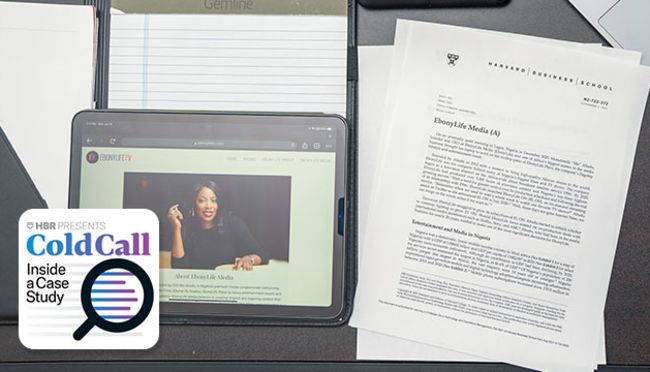
- 08 Feb 2022
- Cold Call Podcast
What’s Next for Nigerian Production Studio EbonyLife Media?
After more than 20 years in the media industry in the UK and Nigeria, EbonyLife Media CEO Mo Abudu is considering several strategic changes for her media company’s future. Will her mission to tell authentic African stories to the world be advanced by distributing films and TV shows direct to customers? Or should EbonyLife instead distribute its content through third-party streaming services, like Netflix? Assistant Professor Andy Wu discusses Abudu’s plans for her company in his case, EbonyLife Media. Open for comment; 0 Comments.

- 30 Mar 2020
- Research & Ideas
The New Rules for Remote Work: Pandemic Edition
Welcome to the new world of remote work, where employees struggle to learn the rules, managers are unsure how to help them, and organizations get a glimpse into the future. Open for comment; 0 Comments.
- 29 Nov 2010
- HBS Case
United Breaks Guitars
A new case coauthored by HBS marketing professor John Deighton and research associate Leora Kornfeld offers an object lesson in the dangers social media can bring for big, recognizable companies and their brands. From the HBS Alumni Bulletin. Open for comment; 0 Comments.

- 28 Oct 2010
- Working Paper Summaries
The Distinct Effects of Information Technology and Communication Technology on Firm Organization
At what point in the corporate food chain are big decisions made? It depends on technology, according to new research, which finds that information-based software will help to push decisions further down the corporate ladder, whereas communication technologies will push decisions up to the top. Research was conducted by Nicholas Bloom of Stanford University; Assistant Professor Raffaella Sadun of Harvard Business School; and Luis Garicano and John Van Reenen of the London School of Economics. Key concepts include: Enterprise Resource Planning software is a decentralizing technology: It provides information that enables lower-level managers to make more decisions without consulting their superiors. By the same token, Computer Assisted Design software creates a situation in which the worker needs less access to superiors in order to make a decision. On the other hand, the better the data network, the easier it is for workers to communicate with their superiors and to rely on them to make decisions. Closed for comment; 0 Comments.

Why TikTok Is Beating YouTube for Eyeball Time (It’s Not Just the Dance Videos)
Quirky amateur video clips might draw people to TikTok, but its algorithm keeps them watching. John Deighton and Leora Kornfeld explore the factors that helped propel TikTok ahead of established social platforms, and where it might go next.